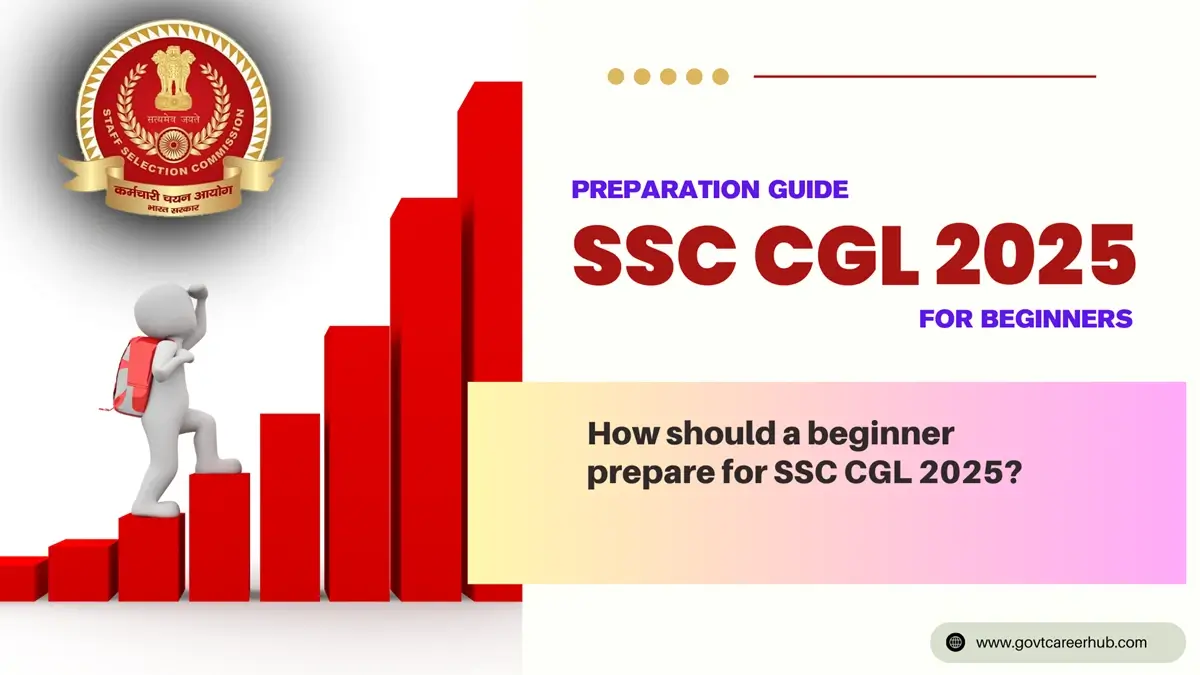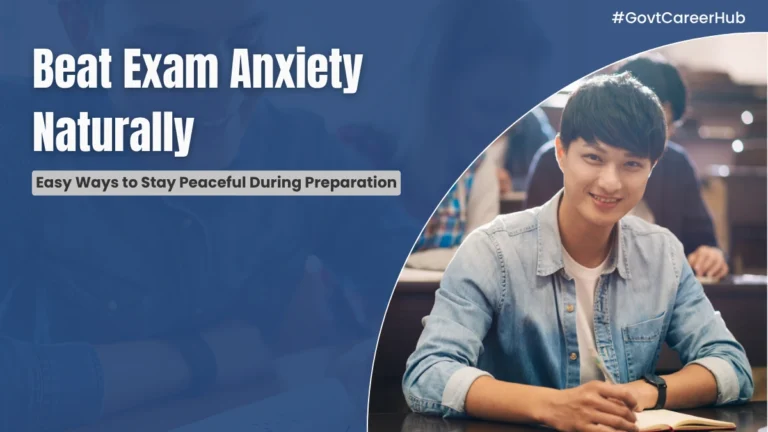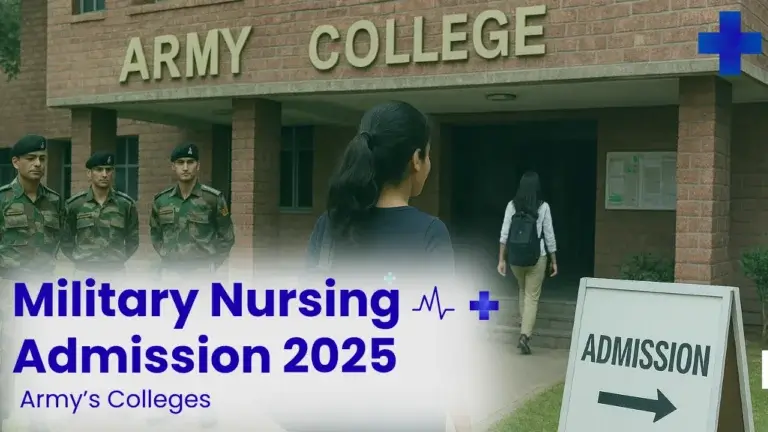SSC CGL Preparation Strategy for Beginners 2025 [Complete Guide with Study Plan & Expert Tips]

Last Updated: August 4, 2025 at 4:56 pm
How should a beginner prepare for SSC CGL 2025?
Start with understanding the exam pattern, build concepts from basics, follow a 3–6 month study plan, use standard books, and take regular mock tests.
Are you dreaming of a stable government job but feeling overwhelmed by the SSC CGL exam? You’re not alone! Every year, millions of aspirants compete for prestigious positions in various government departments through the Staff Selection Commission Combined Graduate Level (SSC CGL) examination. While the competition is intense, the good news is that with the right SSC CGL preparation strategy 2025, even absolute beginners can crack this exam on their first attempt.
Whether you’re a fresh graduate wondering how to prepare for SSC CGL from zero or a working professional looking to switch careers, this comprehensive SSC CGL beginner guide will provide you with everything you need to transform your government job dreams into reality.
Latest Update
- Last Date of Application SSC CGL 2025: July 04, 2025(Closed)
- Tier-1 Exam (Expected): August 2025
- Tier-2 Exam (Expected): October 2025
- Result Declaration: December 2025
Understanding SSC CGL 2025: What Makes It Special?
The SSC CGL exam opens doors to Group B and Group C positions in prestigious government departments like Income Tax, Central Excise, Customs, and many more. With attractive salary packages, job security, and excellent career growth opportunities, it’s no wonder that SSC CGL remains one of India’s most sought-after competitive exams.
However, success in SSC CGL isn’t just about hard work – it’s about working smart with a well-structured approach.
Complete Exam Structure 2025
| Tier | Papers | Subjects | Questions | Marks | Time | Mode |
|---|---|---|---|---|---|---|
| Tier I | 1 Paper | GA, QA, Reasoning, English | 100 | 200 | 60 min | Online |
| Tier II | Paper I (All) | Math, Reasoning, English, GA, Computer | 200 | 400 | 120 min | Online |
| Paper II (Specific) | Statistics/Finance & Economics | 100 | 200 | 60 min | Online | |
| Tier III | 1 Paper | Descriptive (English/Hindi) | – | 100 | 60 min | Offline |
| Tier IV | Skill Test | Typing/Data Entry | – | Qualifying | – | Offline |
Tier I Syllabus Breakdown (Your Primary Focus)
General Intelligence & Reasoning (25 Questions)
- Analogies, similarities, differences
- Space visualization, problem-solving
- Blood relations, direction sense test
- Arithmetic reasoning, coding-decoding
- Series completion, pattern recognition
General Awareness (25 Questions)
- Indian History, Geography, Polity
- Economics and General Science
- Current Affairs (last 6 months crucial)
- Sports, awards, books & authors
- Important government schemes
Quantitative Aptitude (25 Questions)
- Number systems, percentages, ratios
- Profit & Loss, Time & Work, SI/CI
- Geometry, mensuration, trigonometry
- Data interpretation, basic statistics
- Algebra and arithmetic progressions
English Comprehension (25 Questions)
- Reading comprehension passages
- Grammar rules and error detection
- Vocabulary (synonyms, antonyms)
- Sentence improvement and rearrangement
- Cloze test and fill in the blanks
The Reality Check: How Much Time Do You Really Need?
One question I get asked constantly: “Sir, can I crack SSC CGL in 3 months?”
Here’s my honest answer based on mentoring hundreds of students: It depends on where you’re starting from.
I once guided Priya, a working professional from Pune, who started her preparation just 4 months before the exam. She had a decent academic background but hadn’t touched mathematics in years. With focused preparation (2.5 hours daily), she not only cleared Tier I but also secured an Income Tax Inspector position.
On the flip side, I’ve seen students with 12+ months of preparation struggle because they lacked direction and consistency.
Realistic Time Assessment
If you’re starting from zero:
- Minimum viable timeframe: 4-6 months with 3-4 hours daily
- Comfortable preparation: 6-8 months with 2-3 hours daily
- Relaxed pace: 8-12 months with 1-2 hours daily
Your 6-Month Battle Plan: From Zero to Hero
Based on my experience with successful candidates, here’s a month-by-month roadmap that actually works:
Phase 1: Foundation Building (Months 1-2)
| Month | Focus Areas | Daily Hours | Key Activities |
|---|---|---|---|
| Month 1 | Basic concepts + Habit formation | 2-3 hours | Diagnostic test • Syllabus understanding • Resource gathering • Study routine establishment |
| Month 2 | Concept strengthening | 3-4 hours | Chapter-wise study • Basic problem solving • Current affairs start • Weekly mini-tests |
Week-by-Week Breakdown (Month 1):
Week-1: Take a full diagnostic test (don’t worry about scores), analyze your strengths and weaknesses, gather all study materials.
Week-2-3: Start with your strongest subject to build confidence. If you love math, begin with Quantitative Aptitude. If you’re good with languages, start with English.
Week-4: Introduce your weakest subject gradually. The key is building momentum, not overwhelming yourself.
Phase 2: Skill Development (Months 3-4)
| Month | Focus Areas | Daily Hours | Key Activities |
|---|---|---|---|
| Month 3 | Speed and accuracy | 4-5 hours | Advanced topics • Shortcut techniques • Subject-wise tests • Error analysis |
| Month 4 | Integration and practice | 4-5 hours | Mixed topic tests • Previous year papers • Mock test start • Revision strengthening |
Phase 3: Mastery and Fine-tuning (Months 5-6)
| Month | Focus Areas | Daily Hours | Key Activities |
|---|---|---|---|
| Month 5 | Mock tests and analysis | 3-4 hours | Daily mock tests • Detailed analysis • Weak area focus • Strategy refinement |
| Month 6 | Peak performance | 2-3 hours | Final revision • Confidence building • Exam day preparation • Stress management |
Subject-Wise Mastery: The Strategies That Actually Work
Quantitative Aptitude: Your Scoring Goldmine
QA is where most students either make it or break it. Here’s what separates the winners from the rest:
High-Priority Topics (Focus 80% of your QA time here):
- Arithmetic (40-45% of QA section): Percentages, Profit & Loss, SI/CI, Time & Work, Time-Speed-Distance, Ratio & Proportion
- Algebra (15-20%): Basic equations, age problems, average problems
- Geometry (20-25%): Triangles, circles, mensuration basics
- Data Interpretation (10-15%): Tables, bar graphs, pie charts
QA Success Formula:
- Master the basics first: Don’t jump to complex problems if you’re making errors in percentage calculations
- Learn shortcuts, but understand the logic: Memorizing tricks without understanding will fail you in variations
- Practice daily calculations: 15 minutes of mental math daily works wonders
- Time yourself religiously: Aim for 60-90 seconds per question
Common QA Mistakes (And How to Avoid Them):
- Mistake: Spending too much time on geometry while ignoring high-weightage arithmetic
- Solution: Follow the 80-20 rule – master high-weightage topics first
Books Recommend:
- Theory: R.S. Aggarwal Quantitative Aptitude (comprehensive but lengthy)
- Practice: Kiran’s SSC Mathematics (concise, exam-focused)
- Shortcuts: Fast Track Objective Arithmetic by Rajesh Verma
Reasoning: Pattern Recognition Made Simple
Reasoning is like learning to ride a bicycle – once you get the patterns, it becomes second nature. Here’s how to master it:
Daily Practice Schedule:
- Morning (15 mins): Verbal reasoning (analogies, series)
- Evening (20 mins): Non-verbal reasoning (patterns, figures)
- Night (10 mins): Logic-based problems (blood relations, directions)
Topic-Wise Strategy:
Analogies & Series: Practice 10 questions daily. Create your own logic patterns.
Blood Relations: Draw family trees. It sounds basic, but it works.
Coding-Decoding: Learn standard patterns, but focus on understanding the logic rather than memorizing.
Direction & Distance: Always draw rough diagrams. Visual learning is powerful here.
Personal Tip: I always tell students to solve reasoning questions out loud (when practicing alone). Verbalizing your thought process helps identify logical gaps.
English: Your Consistency Builder
English is the most predictable section if approached correctly. Here’s proven strategy:
Daily Routine (30-40 minutes total):
- 10 minutes: Vocabulary (5 new words with sentences)
- 15 minutes: Grammar rules + practice questions
- 10 minutes: Reading (newspaper editorial or short story)
- 5 minutes: Previous day vocabulary revision
Grammar Focus Areas:
- Tenses: Master the 12 basic tenses
- Subject-Verb Agreement: Practice with tricky examples
- Prepositions: Create your own reference list
- Active-Passive Voice: Learn the conversion rules
Vocabulary Building Strategy: Instead of random word lists, focus on:
- Root words: Learn prefixes and suffixes
- Contextual learning: Use new words in sentences immediately
- Daily usage: Try to use 2-3 new words in conversations
Reading Comprehension Hack: Read the questions first, then the passage. This helps you read with purpose and saves time.
General Awareness: The Smart Student’s Approach
GA can be overwhelming, but here’s how to make it manageable:
The 70-30 Rule:
- 70% time: Static GK (History, Geography, Polity, Economics, Science)
- 30% time: Current Affairs (last 6-12 months)
Static GK Study Plan:
| Subject | Weekly Time | Key Resources |
|---|---|---|
| History | 2 hours | NCERT Class 6-12, Spectrum Modern History |
| Geography | 2 hours | NCERT Class 6-12, Certificate Physical Geography |
| Polity | 2 hours | NCERT Class 9-12, Indian Polity by Laxmikanth |
| Economics | 1.5 hours | NCERT Class 9-12, Indian Economy by Ramesh Singh |
| Science | 1.5 hours | NCERT Class 6-10, Lucent’s General Science |
Current Affairs Mastery:
- Daily: Read one national newspaper (The Hindu/Indian Express)
- Weekly: Go through current affairs magazines (Pratiyogita Darpan/Chronicle)
- Monthly: Revise the entire month’s current affairs
- Before Exam: Focus on last 6 months’ major events
Pro Tip: Create monthly current affairs sheets with 4 categories:
- National: Government schemes, policies, appointments
- International: Major global events, India’s relations
- Sports & Awards: Recent achievements, winners
- Miscellaneous: Books, authors, important dates
Resource Arsenal: Books, Apps, and Hidden Gems
When it comes to SSC CGL preparation, choosing the right resources can make a huge difference. Based on expert recommendations and consistent success rates among aspirants, here are some of the most reliable tools and materials:
Books Comparison Table
| Subject | Best for Theory | Best for Practice | Best for Shortcuts |
|---|---|---|---|
| Quantitative Aptitude | R.S. Aggarwal | Kiran’s Mathematics | Fast Track Arithmetic |
| Reasoning | R.S. Aggarwal | Kiran’s Reasoning | Analytical Reasoning (MK Pandey) |
| English | Wren & Martin | Objective English (SP Bakshi) | Word Power Made Easy |
| General Awareness | Lucent’s GK | Chronicle Monthly | Manorama Yearbook |
Free Resources That Actually Help
YouTube Channels (I personally follow these):
- Adda247: Comprehensive coverage, regular updates
- StudyIQ: Excellent for current affairs
- Dear Sir: Great for mathematical shortcuts
- SSC ADDA: Focused SSC content
Mobile Apps Worth Your Time:
- Testbook: Best for sectional tests
- Gradeup: Good community features
- Oliveboard: Excellent mock tests
- Current Affairs by Jagran Josh: Daily updates
Telegram Channels (Game-Changers):
- SSC CGL Notes: Daily study materials
- Current Affairs Today: Crisp daily updates
- Previous Year Questions: Topic-wise question banks
Mock Tests: Your Reality Check System
Here’s where most students go wrong – they either avoid mocks or don’t analyze them properly.
Mock Test Strategy
Phase-wise Mock Schedule:
| Preparation Phase | Mock Frequency | Focus |
|---|---|---|
| Months 1-2 | 1 per month | Baseline assessment |
| Months 3-4 | 1 per week | Skill development |
| Months 5-6 | 3-4 per week | Peak performance |
The 3-Step Mock Analysis Process:
Step–1: Immediate Review (Right after the test)
- Note overall score and section-wise performance
- Identify questions you were confident about but got wrong
- List topics where you spent too much time
Step–2: Deep Analysis (Next day)
- Categorize mistakes: Silly errors vs Knowledge gaps vs Time pressure
- Create a weakness list for focused study
- Time analysis: Which sections took longer than planned?
Step–3: Action Planning (Within 2 days)
- Plan specific study sessions to address identified weaknesses
- Set improvement targets for the next mock test
- Adjust study schedule based on insights
Mock Test Platforms Recommend:
- Testbook: Most similar to actual exam interface
- Oliveboard: Excellent detailed analysis
- PracticeMock: Good free options available
- Career Power: Comprehensive question bank
Working Professional’s Survival Guide
Balancing a full-time job while preparing for SSC CGL can feel overwhelming. But with the right strategy and consistency, it’s absolutely possible. Here’s a realistic approach tailored for beginners and working professionals alike:
Sample Daily Routine for Working Professionals
Morning Routine (6:00 AM – 8:00 AM):
- 6:00-6:15 AM: Fresh up, coffee, mindset preparation
- 6:15-7:15 AM: Core study (your strongest subject)
- 7:15-8:00 AM: Current affairs reading + revision
Commute Time (if applicable):
- Listen to educational podcasts
- Revise previous day’s vocabulary
- Mental math practice
Lunch Break (30-45 minutes):
- Quick practice tests (10-15 questions)
- Current affairs apps
- Revision of morning study
Evening Routine (8:00 PM – 10:00 PM):
- 8:00-9:00 PM: Problem-solving practice
- 9:00-9:30 PM: Weak area focus
- 9:30-10:00 PM: Planning next day + relaxation
Weekend Strategy:
- Saturday: 4-5 hours intensive study + 1 mock test
- Sunday: 3-4 hours revision + mock test analysis + planning
Time-Blocking Examples for Professionals
High-Efficiency 2-Hour Block:
- 0-15 minutes: Review yesterday’s mistakes
- 15-75 minutes: New topic study (focused, no distractions)
- 75-105 minutes: Practice questions on the same topic
- 105-120 minutes: Quick revision + tomorrow’s planning
Quick 45-Minute Session:
- 0-5 minutes: Settle down, review objectives
- 5-30 minutes: Practice test (25 questions)
- 30-40 minutes: Answer analysis
- 40-45 minutes: Note key learnings
Read Also:
No post found!
The 7 Deadly Mistakes Beginners Make
These patterns have been observed consistently in the preparation journeys of many aspirants. It’s always wise to learn from common mistakes and avoid the pitfalls others have faced:
1. #Mistake: Information Overload Syndrome
What I see: Students buying 15 different books, joining 10 YouTube channels, following 20 Telegram groups.
Reality check: Arjun, one of my students, spent 3 months just collecting resources and never actually studied consistently from any single source.
My solution: Pick ONE primary resource per subject. Stick to it for at least 2 months before considering alternatives.
2. #Mistake: The Mock Test Avoider
What I see: “Sir, I’ll start taking mocks once I complete the syllabus.”
Reality check: The syllabus is never truly “complete.” You’ll always find something new to study.
My solution: Start taking mocks after covering 40-50% of any subject. Early feedback is crucial.
3. #Mistake: The Perfectionist Trap
What I see: Students spending 3 hours on 5 difficult questions instead of practicing 25 moderate-level questions.
Reality check: SSC CGL rewards consistency and accuracy, not perfection in difficult problems.
My solution: Follow the 80-20 rule. Master 80% of moderate-level questions before tackling the difficult 20%.
4. #Mistake: Current Affairs Overemphasis
What I see: Students spending 2 hours daily on current affairs while neglecting static GK.
Reality check: Static GK has more predictable question patterns and higher success rates.
My solution: 70% static GK, 30% current affairs. No exceptions.
5. #Mistake: The Coaching Center Dependency
What I see: “I can’t study without joining a coaching center.”
Reality check: I’ve seen self-study students consistently outperform coached students who lacked self-discipline.
My solution: Coaching is helpful but not essential. Self-discipline and consistency matter more.
6. #Mistake: Ignoring Previous Year Papers
What I see: Students practicing random questions instead of understanding actual exam patterns.
Reality check: SSC tends to repeat question types and patterns. Previous years’ papers are goldmines.
My solution: Solve at least 10 years of previous papers. Identify patterns and frequently asked topics.
7. #Mistake: Last-Minute Panic Preparation
What I see: “Sir, I have 1 month left. Can I still crack it?”
Reality check: While possible, it’s extremely stressful and usually leads to incomplete preparation.
My solution: Start today, not tomorrow. Even 15 minutes daily is better than 3 hours once a week.
Success Mantras from Toppers
“Consistency beats intensity. 4 hours of focused daily study is better than 12 hours of distracted study once a week.” – SSC CGL Topper 2023
“Your mock test scores don’t define your potential. Every wrong answer is a step closer to the right approach.” – SSC CGL Topper 2024
Your Next Steps: The Implementation Roadmap
Reading this guide is just the beginning. Here’s how to actually implement everything:
Week-1: Foundation Setting
- Take a diagnostic test to assess current level
- Buy/arrange the recommended books for each subject
- Set up a dedicated study space
- Download essential apps and bookmark useful websites
- Create a study schedule that fits your routine
Week-2: Habit Formation
- Start with your strongest subject (build confidence)
- Begin current affairs reading (15 minutes daily)
- Take your first sectional test
- Join online communities for motivation
- Create your first set of revision notes
Week-3-4: Momentum Building
- Introduce your weakest subject gradually
- Start maintaining an error log
- Take your first full-length mock test
- Analyze performance and adjust strategy
- Set monthly improvement targets
Monthly Review Process
- Assessment: What worked well? What didn’t?
- Adjustment: Modify study plan based on performance
- Alignment: Ensure you’re on track with overall timeline
- Motivation: Celebrate small wins and learn from setbacks
The Mindset That Wins: Mental Strategies for Success
Success in SSC CGL isn’t just about academic preparation – it’s about developing the right mindset. Here’s what I’ve learned from successful candidates:
The Growth Mindset Approach
- Instead of: “I’m bad at mathematics”
- Think: “I’m improving my mathematical skills daily”
- Instead of: “This topic is too difficult”
- Think: “This topic requires more practice, and that’s okay”
Dealing with Setbacks
Every student faces moments of doubt. Here’s how to bounce back:
When mock test scores disappoint:
- Remember that mocks are learning tools, not judgment tools
- Focus on the learning, not the score
- Analyze mistakes systematically
- Adjust strategy based on insights
- Stay committed to the process
When motivation drops:
- Reconnect with your ‘why’ – why do you want this job?
- Read success stories of people from similar backgrounds
- Take a day off if needed, but return with renewed energy
- Focus on small, achievable daily goals
- Celebrate consistency over perfection
The Power of Community
Join online study groups, but choose wisely:
- Look for: Supportive, focused, solution-oriented groups
- Avoid: Negative, complaint-focused, distraction-heavy groups
Final Words: Your Journey Starts Now
The SSC CGL examination is not just a test of knowledge – it’s a test of persistence, strategy, and smart preparation. With this comprehensive SSC CGL preparation strategy 2025, you now have a roadmap that has helped thousands of candidates achieve their government job dreams.
Remember, every expert was once a beginner. The difference between those who succeed and those who don’t isn’t talent or luck – it’s the willingness to follow a systematic approach and persist through challenges.
Your dream government job is not just a possibility; it’s an inevitability if you commit to this preparation strategy. The path may seem long, but every day of preparation brings you closer to your goal.
Read Also: Best Books for SSC CGL Preparation at Home 2025: Complete Subject-Wise Guide
FAQs
Your background doesn’t determine your future. Your daily actions do.
Start today. Start small. But start.
The government job you dream of is not just a possibility – it’s an inevitability if you commit to the process.
Free Resources to Get You Started Right Now
Download these immediately:
- [SSC CGL Previous Year Papers – Last 10 Years]
- [Monthly Current Affairs Compilation]
- [Important Formulas Cheat Sheet]
- [Study Schedule Template]
Join these communities:
- SSC CGL Aspirants Telegram Group
- Reddit SSC Community
- Facebook Study Groups (location-specific)
Book your first mock test:
- Testbook Free Mock Test
- Oliveboard Diagnostic Test
- Career Power Sample Test
Ready to begin your transformation journey? Drop a comment below with your biggest SSC CGL preparation concern, and I’ll personally help you create a customized action plan. Your success story starts with that first comment.
Remember: Every expert was once a beginner. Every pro was once an amateur. Every icon was once an unknown. The only difference? They started.
Upcoming Last Date Alert
| Job / Exam Name | Last Date | Apply Link | Complete Details |
|---|---|---|---|
| Agniveer Vayu Rally 2025 | 14th Sep 2025 | Official Link | Click Here! |
| Indian Army JAG Entry Scheme 2026 | 03 Sep 2025 | Apply Now! | Click Here! |
| MP Varg-3 Primary Teacher Recruitment 2025 | 25 Aug 2025 | Apply Now! | Click Here! |






